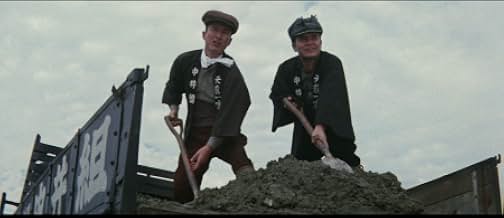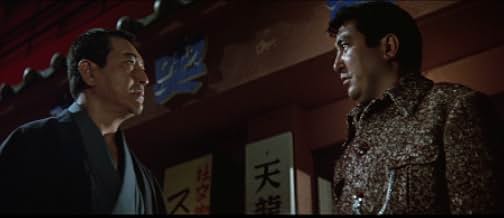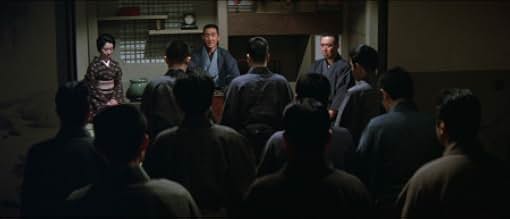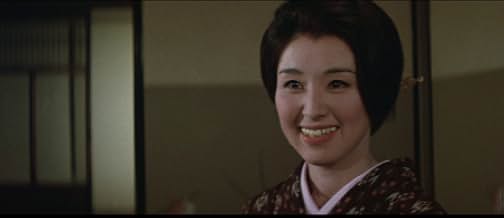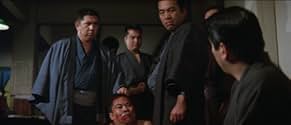Tokio, 1934. El jefe del clan que controla el juego agoniza y algunos de sus seguidores le proponen a Nakai que tome su lugar, pero él rechaza la oferta y sugiere que elijan a Matsuda, que e... Leer todoTokio, 1934. El jefe del clan que controla el juego agoniza y algunos de sus seguidores le proponen a Nakai que tome su lugar, pero él rechaza la oferta y sugiere que elijan a Matsuda, que está en prisión.Tokio, 1934. El jefe del clan que controla el juego agoniza y algunos de sus seguidores le proponen a Nakai que tome su lugar, pero él rechaza la oferta y sugiere que elijan a Matsuda, que está en prisión.
Argumento
¿Sabías que...?
- CuriosidadesPaul Schrader considers it "the greatest of the Toei yakuza films", calling it "an art house rose blooming from exploitation roots."
Reseña destacada
For all the many yakuza flicks that have ever been made, this one is perhaps a tad atypical. Most are set in the late 40s, the 50s or 60s, or beyond, speaking to the chaos in Japan following the end of World War II and the subsequent surge of the criminal underworld; this is notably set in the years preceding the war. Moreover, while one can hardly tell a story about the yakuza without strong violence, this one broadly adopts a relatively soft and more dramatic approach, perhaps recalling Coppola's 'The godfather' as bursts of violence are woven in amidst quiet but tense scenes of flaring temperaments, internal politics, and the structure of the clan. Between Kasahara Kazuo's screenplay and Yamashita Kasuko's firm direction, however, this is all that 'Big time gambling boss' requires to be striking and compelling: the tale of a clan that controls gambling in Tokyo; freshly paroled Matsuda, who takes major exception to the decisions of the leadership; and even-tempered Nakai, caught between his loyalty to the clan and his loyalty to Matsuda. While this isn't an especially famous film, it's wonderfully engrossing and satisfying as the minutes tick by, and I'm well of the mind that it deserves much more recognition.
Tensions rise and events escalate as the length draws on, and the more restrained airs of charged drama give way to fiercer vibrancy to be paid for with blood and lives. From top to bottom the writing is stupendous in conjuring a saga of loyalties divided, broken, or unyielding, a conflict between fiery spirits and resolute minds, and backroom deals. Whether one is looking to the narrative at large, each scene, the characters, or the dialogue, the writing is impeccably shrewd in shaping a movie that's greatly absorbing and satisfying. The same certainly applies to the direction, keeping a low-key tone so that the rich, tragic story can speak entirely for itself, and the violence is all the uglier in turn. I'm so deeply pleased with how smartly this was made, for from start to finish there's a buzzing electricity about it all that facilitates not just emotional investment but even a sense of suspense. All throughout this is bolstered by the superb original music of Tsushima Toshiaki, deftly calculated in its dynamics that know when to be thunderous in its chords and instrumentation, and when to be absent altogether. Similarly, the tremendous acting is just as essential, characterized by exceptional poise, nuance, and tightly controlled emotional depth, and while Wakayama Tomisaburo and Tsuruta Koji may stand out most as Matsuda and Nakai, the supporting cast is just as outstanding in bringing the sordid tale to bear.
In every other regard I've only praise for the folks involved, for this looks fantastic all around. The production design, art direction, costume design, and hair and makeup are all splendidly sharp and full of detail, readily immersing us in the world of the picture. Where stunts, fight choreography, and practical effects bring the violence to life it is jarring and vivid. Among still more, Yamagishi Nagaki's cinematography is surely also worth mentioning, crisp and clean as we see through the camera's eye, with some swell choices of lighting no less. In every capacity 'Big time gambling boss' is plainly excellent, and to sit and watch, it's somewhat surprising that it's not more well known. I wouldn't necessarily say that it wholly demands viewership, but it would be a sore mistake to pass up an opportunity to watch, and the title is one that's far more than it might look like from the outside. I'm very glad that I took the time to watch, and glad to give this my very hearty recommendation.
Tensions rise and events escalate as the length draws on, and the more restrained airs of charged drama give way to fiercer vibrancy to be paid for with blood and lives. From top to bottom the writing is stupendous in conjuring a saga of loyalties divided, broken, or unyielding, a conflict between fiery spirits and resolute minds, and backroom deals. Whether one is looking to the narrative at large, each scene, the characters, or the dialogue, the writing is impeccably shrewd in shaping a movie that's greatly absorbing and satisfying. The same certainly applies to the direction, keeping a low-key tone so that the rich, tragic story can speak entirely for itself, and the violence is all the uglier in turn. I'm so deeply pleased with how smartly this was made, for from start to finish there's a buzzing electricity about it all that facilitates not just emotional investment but even a sense of suspense. All throughout this is bolstered by the superb original music of Tsushima Toshiaki, deftly calculated in its dynamics that know when to be thunderous in its chords and instrumentation, and when to be absent altogether. Similarly, the tremendous acting is just as essential, characterized by exceptional poise, nuance, and tightly controlled emotional depth, and while Wakayama Tomisaburo and Tsuruta Koji may stand out most as Matsuda and Nakai, the supporting cast is just as outstanding in bringing the sordid tale to bear.
In every other regard I've only praise for the folks involved, for this looks fantastic all around. The production design, art direction, costume design, and hair and makeup are all splendidly sharp and full of detail, readily immersing us in the world of the picture. Where stunts, fight choreography, and practical effects bring the violence to life it is jarring and vivid. Among still more, Yamagishi Nagaki's cinematography is surely also worth mentioning, crisp and clean as we see through the camera's eye, with some swell choices of lighting no less. In every capacity 'Big time gambling boss' is plainly excellent, and to sit and watch, it's somewhat surprising that it's not more well known. I wouldn't necessarily say that it wholly demands viewership, but it would be a sore mistake to pass up an opportunity to watch, and the title is one that's far more than it might look like from the outside. I'm very glad that I took the time to watch, and glad to give this my very hearty recommendation.
- I_Ailurophile
- 30 ago 2024
- Enlace permanente
Selecciones populares
Inicia sesión para calificar y añadir a tu lista para recibir recomendaciones personalizadas
- How long is Big Time Gambling Boss?Con tecnología de Alexa
Detalles
- Fecha de lanzamiento
- País de origen
- Idioma
- Títulos en diferentes países
- Big Time Gambling Boss
- Empresa productora
- Ver más compañías en los créditos en IMDbPro
- Duración1 hora 35 minutos
- Mezcla de sonido
- Relación de aspecto
- 2.35 : 1
Contribuir a esta página
Sugerir un cambio o añadir el contenido que falta

Principal laguna de datos
By what name was Bakuchiuci: Sôchô Tobaku (1968) officially released in India in English?
Responde
